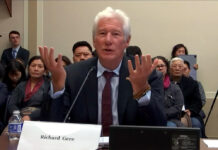
(TibetanReview.net, Mar27’19) – The first of the US State Department’s reports mandated by the Reciprocal Access to Tibet Act of 2018 is out and it says China continues to “systematically” impede access to Tibet with restrictions that have prohibited diplomats, journalists and ordinary citizens from visiting the Himalayan territory. Under the Act, officials responsible for impeding access face ban from entering the US. The Act was signed into law by President Donald Trump in Dec 2018. China has responded by reiterating its claim that the Act interferes in China’s internal affairs.
The law, which notes that no US region is prohibited to Chinese citizens, requires the United States by the end of this year to deny visas to Chinese officials in charge of implementing the policy of impeding access to Tibet.
“The Chinese government systematically impeded travel to the Tibetan Autonomous Region (TAR) and Tibetan areas outside the TAR for US diplomats and officials, journalists and tourists in 2018,” the AFP Mar 26 quoted the State Department as saying in its report to Congress.
Even visits by US diplomats were “highly restricted,” the report was quoted as saying, noting, “Chinese government-designated minders followed US diplomats and officials at all times, prevented them from meeting or speaking with local contacts, interrogated them and restricted their movement in these areas.”
The AFP report noted that Tibet remained the only region for which China requires diplomats and journalists to seek special access.
The State Department has noted that last year China rejected five of the nine US requests to visit Tibet, including one by Ambassador Terry Branstad. The report continued that of the visits that went ahead, two were for routine consular matters, one was for the consul general in nearby Chengdu and the other was for security officials to prepare the visit by Branstad that was ultimately denied.
Regarding access to journalists, the State Department, quoting the Foreign Correspondents’ Club of China, has said only seven international journalists sought permission to visit Tibetan areas last year, compared with dozens in past years, with reporters sensing “the apparent futility of applying”.
China was also stated to have denied access to tourists during times seen as politically sensitive while Americans of Tibetan ancestry had complained of being singled out for special screening.
Reiterating its previous claims about the Act being an interference in China’s internal affairs, the country’s Foreign Ministry on Mar 26 maintained that it “has severely violated the basic codes of international relations and is a violent interference with China’s internal affairs.”
“The RATA sends a wrong signal to Tibetan separatists and poses serious harm to the China-US communication and cooperation,” China’s official globaltimes.cn Mar 26 quoted Foreign Ministry spokesperson Geng Shuang as saying during a routine press conference.
It cited Geng as stressing that the Tibet region remained open to visitors from every nation while factors including the local unique geographical and climate conditions should be taken into consideration. However, it was not clear why these so-called factors do not apply to mainland Chinese who visit Tibet in tens of millions each year but only to “foreigners”.





